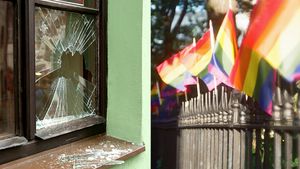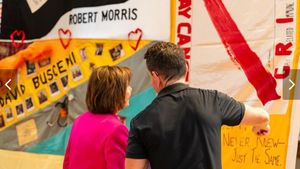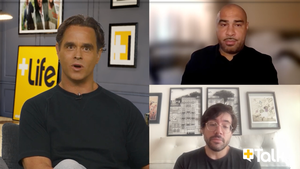"Life is just going to throw whatever it's going to throw at you, but you get to decide how you're going to cope with it." Robert Tennent, an artist based in New Zealand, is discussing the moment he was sexually assaulted in early 2017. He'd been drugged that night, his clothes had been ripped, and he'd managed to get out of the man's house via a fire escape.
After subsequently entering a period of celibacy for five months, in which he attended counseling sessions, Robert slowly started to find solace in the new, intimate encounters he had with men. With their permission, he started taking photos of these men, and captured their stories, as he began to rediscover sexual intimacy once again.
Related | Come Back to Bed Documents Sexual Reawakening After Abuse
"I pulled my camera out and took a photo of him," Robert says, talking about the first guy. "I took a few more. I kept these for myself because I wanted to remember that memory and how I felt when I was with him. I then did this to the next boy, and then the next."
Come Back To Bed is Robert's new project; a book featuring the interactions and conversations he had with 13 men following the assault. It is a journey of sexual liberation, and an exploration into raw, human intimacy.
Robert is remarkably brave, inadvertently advocating for the experiences of many still silenced by their own experiences of abuse. We caught up with the creator, ahead of the book's April 11 pre-order release date, to discuss art being a form of therapy, the bravery associated with speaking your truth, and the slow journey of discovering intimacy once more.

OUT: Can you talk a bit more about the first man you took a photo of? How was that encounter?
Robert Tennent: We had met on Grindr. I was only in Sydney for three or four days and we hung out for those few days. We just clicked. Weirdly, it was one of the most powerful connections I'd ever made with someone. Two months later, I went back and visited him. I took a photo of him after we had sex one time, because I was like, 'Wow, you're very handsome'. He took a couple of me, and then that was it. I developed the film and had it on my phone as a little folder and that was all. Until the next guy. That's how it all started.
These photos convey an incredible sense of intimacy. Was it hard to regain trust on an intimate level again?
It was definitely very hard. The physical act of sex would bring back memories. Some feelings would trigger my body to tense up or [cause me] to freak out. It was also hard to meet people that I felt weren't trying to gain anything from me. Casual sex wasn't a thing... I'd have to meet people a lot more than just once. I had to make a connection with them and gain trust. But when it came to having that big, scary moment of having sex again, they wanted me to be as comfortable as I could be.
It seems like you found respite through your art. Was this a form of therapy for you?
100 percent. The only thing I could do [following the assault] was to think, 'Okay, how am I going to deal with this? How am I going to heal and how am I going to guide myself back?' It's a very happy book, and it's definitely a memory book of everyone that I'd been with who I trusted, and who trusted me to take the photos of them.
How important is it for you to archive,and remember these photos?
To me, these men came into my life at a time when I needed them, a lot. Most of them, if not all of them, I still talk to. We're friends; some of them are in relationships now and I'm just genuinely happy for them. They were there for me when I needed them, and I don't think they understood at the time how important they were to me. Looking back, these 13 people in the book impacted my life and taught me a lot about relationships and sex.
Your writing is so powerful, as well.
Writing was a very important part of me reflecting, and being able to say goodbye, to people who meant a lot to me. These were text messages from me at one in the morning just talking to [the men in the book] about how I felt being away from them. And, also, me trying to remember how I felt while I was with them.

What message are you hoping readers will gain from the book?
That you don't have to be quiet, and you don't have to fear going back to the way things used to be before your assault. It's also a very important conversation that people have to have about healing. I think it's important to deal with what happened, even though you didn't want it to happen.
Definitely. What has this project taught you about yourself?
These men [in the book] taught me self-worth, for sure. I am a happier person now, and I know how to heal. [But] it's not going to change the way I party. I'm still going to go out with friends. I'm still going to wear what I wear and say what I want to say, because I don't want to live in fear, like, 'oh, I have to be careful with who I talk to or what I say'. You don't teach victims that they need to be careful. You need to teach rapists to not rape.
I think I've become a lot more outspoken. I care less about what someone else could say to put me down, I guess. We get to choose how we feel and how we react to things.
Robert Tennent's Come Back To Bed is available for pre-order from April 11. An exhibition for the book will be held in Auckland in May.
Louis Hanson is a writer and activist from Melbourne. Check out his website andInstagram.








































































